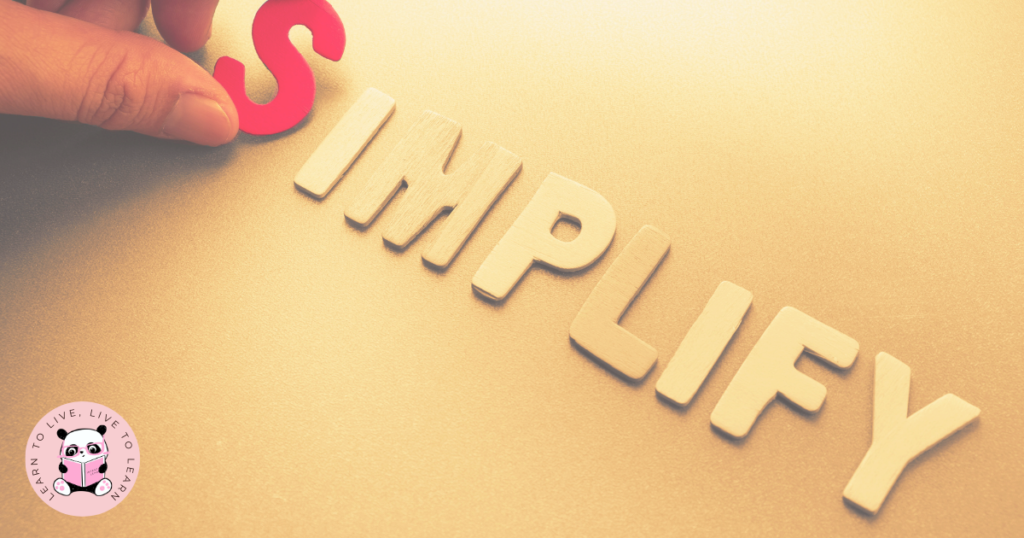How to Simplify Your Life | 14 Things To Eliminate
Written by Michelle Ong | February 27, 2024 | Growth, Wellness

To better understand and effectively manage the desire for more, delve into the list of things we need to banish to simplify our lives.
Simplicity is not about deprivation. It’s about knowing what’s important to you and eliminating everything else.
Simplifying your life isn’t about doing nothing; it’s about making smart choices and focusing on what truly matters. In this post, we’ll explore how letting go of certain traits, mindsets, and habits can clear clutter from your life and help you achieve greater contentment.
1. Assumptions
Thinking you know it all can lead to trouble. Jumping to conclusions without checking can cause bad decisions and stress. When unsure, ask questions to avoid mistakes. Stay open to being wrong and listen to different viewpoints for better decisions. Avoid assuming the worst about people or situations. People have their own reasons, and keeping an open mind and communicating clearly can prevent misunderstandings and reduce stress.
2. Negativity
Here are some honest no-bullshit tips to clear out the clutter from your life:
- Stop Negative Thoughts: Challenge those Automatic Negative Thoughts (ANTs) and focus on the positives and what you can control. Get rid of counterproductive habits.
- Avoid Negative People: Distance yourself from those who bring negativity and never take responsibility. Show them their behavior doesn’t affect you.
- Cut Out Toxicity: Surround yourself with supportive people and avoid those who drag you down.
- Address Issues Constructively: Express your emotions in a healthy way and handle confrontations as opportunities to grow.
- Limit Negative News and Gossip: Too much negativity can affect your well-being. Stay informed but don’t dwell on bad news or gossip.
- Reduce Complaints: Focus on solutions rather than complaining to minimize mental clutter and stress.
3. Grudges
Holding onto grudges is like carrying a heavy weight that drags you down. Instead, try letting go and talking it out if you can. If that doesn’t work, it’s okay to distance yourself. Forgiving someone means freeing yourself from negativity, not forgetting the past.
4. Time Sinks
Cut out time-wasters like endless social media scrolling, binge-watching TV, or aimless online shopping. These activities can clutter your mind and disrupt your sleep. Instead, limit screen time and focus on activities that boost your well-being and personal growth. smart goals
5. Anger
“You will not be punished for your anger, you will be punished by your anger.”
Buddha
Anger often hurts you more than anyone else. It can cloud your judgment and make you feel worse. Instead of letting anger take over, stay calm and focus on finding solutions. Handling situations with a cool head will help you feel better and address problems more effectively.
6. Impulsiveness
Avoid rushing into decisions or focusing only on short-term results. Quick, impulsive choices can lead to problems later. Take your time to evaluate options and gather all the facts. Whether it’s a limited-time offer or a work deadline, consider if it’s truly urgent or if you can make a more informed decision.
7. Obsessive Anxiety
Don’t dwell on what you can’t control. Worrying excessively can disrupt your sleep, affect your appetite, and drain your energy. Instead, focus on what you can change and avoid letting obsessive thoughts take over. Balance and moderation are key to managing stress and preventing harmful behaviors.
8. Overcommitting
Taking on too many commitments can be overwhelming and lead to stress and exhaustion. Trying to please everyone and constantly meeting others’ expectations can take a toll on your well-being. Instead, set personal boundaries and prioritize your own needs. Carefully choose what to say yes to and what to decline. By aligning commitments with your values and abilities, you can avoid burnout, reduce stress, and maintain a healthier balance in your life.
9. Unrealistic Expectations
Expecting everything to fall into place without effort isn’t realistic. Success requires hard work and determination. While having big dreams is great, it’s important to set achievable goals and avoid perfectionism. Start small, set realistic goals, and take things one step at a time. This helps build skills and confidence, while preventing overwhelm and keeping life simpler and less stressful.
10. Self-Centeredness
Hey, don’t sweat the small stuff! Taking everything personally and thinking the world’s out to get you isn’t helpful. Being self-centered and expecting everyone to cater to you just sets you up for disappointment. This attitude can harm relationships and close doors to new opportunities. Keep things in perspective and stay grounded.
11. Lies
Being honest simplifies life. Truthfulness means you don’t have to remember lies, which avoids complicating things. Honesty doesn’t mean sharing every detail but sticking to the truth in a thoughtful way. It keeps you clear of deceit and its complications. Also, be honest with yourself. Ignoring truths or blaming others only fools you. Facing reality helps you grow and make better choices. So, embrace honesty to simplify and improve your life.
12. Ego
A big ego can cause serious trouble. Whether you’re boasting or feeling unworthy, extreme ego is a disaster waiting to happen. When you’re puffed up with ego, you ignore others’ opinions and argue over everything. It blinds you to different perspectives and attracts negativity. Instead of strutting around, stay humble. It makes life simpler and earns you respect. Jealousy and envy come from constant comparison. Let go of your ego, and you’ll find these feelings fade away. So, ditch the big ego and enjoy a more balanced, respectful life.
13. Procrastination
Procrastination is like kicking the can down the road—you keep putting things off, hoping they’ll magically disappear. Spoiler alert: they won’t. Avoiding tasks only makes them pile up, leading to a last-minute scramble and heaps of stress. Instead of letting procrastination control you, tackle tasks head-on. It’s tough at first, but it simplifies things in the long run.
14. Material Clutter
“The more you have, the more you are occupied. The less you have, the more free you are.”
Mother Teresa
Let’s tackle physical clutter. Impulse buys and unnecessary purchases not only strain your finances but also create mess, making it harder to save for important things like emergencies or long-term goals. Start by decluttering your space—if you don’t need it, get rid of it. Don’t hoard items just for the sake of having them. Excess stuff can cause stress, disrupt focus, and lower productivity. By simplifying your space, you’ll make it easier to find things, keep your area organized, and ultimately save time, reduce stress, and boost your mood.
Take Action
“The ability to simplify means to eliminate the unnecessary so that the necessary may speak.”
Hans Hofmann
Life isn’t about instant fixes, but you’re on the right path by identifying and removing what clutters your life. You’re already halfway to a simpler, stress-free existence. Now, you just need some rules to maintain it.
Did you find this article useful? Please like and share it so others can also benefit from it!

